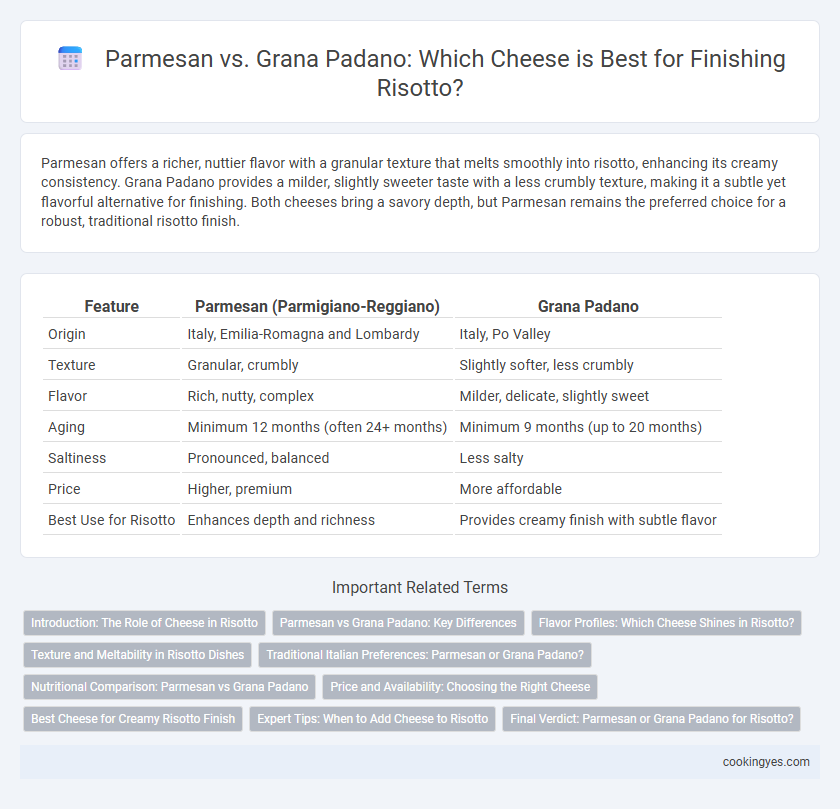Parmesan offers a richer, nuttier flavor with a granular texture that melts smoothly into risotto, enhancing its creamy consistency. Grana Padano provides a milder, slightly sweeter taste with a less crumbly texture, making it a subtle yet flavorful alternative for finishing. Both cheeses bring a savory depth, but Parmesan remains the preferred choice for a robust, traditional risotto finish.
Table of Comparison
| Feature | Parmesan (Parmigiano-Reggiano) | Grana Padano |
|---|---|---|
| Origin | Italy, Emilia-Romagna and Lombardy | Italy, Po Valley |
| Texture | Granular, crumbly | Slightly softer, less crumbly |
| Flavor | Rich, nutty, complex | Milder, delicate, slightly sweet |
| Aging | Minimum 12 months (often 24+ months) | Minimum 9 months (up to 20 months) |
| Saltiness | Pronounced, balanced | Less salty |
| Price | Higher, premium | More affordable |
| Best Use for Risotto | Enhances depth and richness | Provides creamy finish with subtle flavor |
Introduction: The Role of Cheese in Risotto
Parmesan and Grana Padano are essential cheeses that elevate risotto by adding rich umami and creamy texture. Parmesan, aged longer, offers a sharp, nutty flavor, while Grana Padano provides a milder, slightly sweet taste that blends seamlessly. Both cheeses enhance the silkiness of the risotto, balancing its delicate starchiness and intensifying overall depth.
Parmesan vs Grana Padano: Key Differences
Parmesan, known as Parmigiano-Reggiano, offers a more complex, nutty flavor with granular texture due to its minimum 12-month aging process, ideal for rich risotto finishes. Grana Padano, aged for at least 9 months, features a milder, creamier taste and a slightly softer texture, providing a subtler cheese finish. Both cheeses enhance risotto, but Parmesan delivers bold umami depth while Grana Padano ensures a delicate, smooth finish.
Flavor Profiles: Which Cheese Shines in Risotto?
Parmesan offers a rich, nutty, and slightly sharp flavor that enhances risotto with its complex umami depth, while Grana Padano provides a milder, creamier taste with a subtle sweetness and less intense saltiness. The choice depends on whether a stronger, more pronounced cheese character is desired, favoring Parmesan, or a delicate, smooth finish that complements without overwhelming, suited for Grana Padano. Both cheeses melt evenly, but Parmesan's aged, granular texture contributes to a more robust and savory risotto flavor profile.
Texture and Meltability in Risotto Dishes
Parmesan offers a granular texture with a rich, complex flavor that melts smoothly into risotto, creating a creamy consistency. Grana Padano has a slightly softer texture and melts more readily, lending a silkier finish to the dish. Both cheeses enhance risotto's creaminess, but Parmesan provides a more robust texture, while Grana Padano delivers a gentler melt.
Traditional Italian Preferences: Parmesan or Grana Padano?
Traditional Italian risotto recipes often favor Parmesan (Parmigiano-Reggiano) due to its rich, nutty flavor and granular texture that melts smoothly into the creamy rice. Grana Padano offers a milder, slightly sweeter taste with a less crumbly texture, making it a popular yet subtler alternative in Northern Italian cuisine. Both cheeses enhance risotto's depth, but Parmesan remains the preferred choice for authentic, robust flavor profiles.
Nutritional Comparison: Parmesan vs Grana Padano
Parmesan cheese contains approximately 431 calories and 38 grams of protein per 100 grams, while Grana Padano offers slightly fewer calories at 393 and 33 grams of protein. Both cheeses are rich in calcium, with Parmesan providing around 1,184 mg per 100 grams compared to Grana Padano's 1,170 mg, supporting bone health effectively. The sodium content differs, with Parmesan at about 1,560 mg per 100 grams and Grana Padano slightly lower at 1,300 mg, making Grana Padano a modestly better option for reduced salt intake in risotto finishing.
Price and Availability: Choosing the Right Cheese
Parmesan and Grana Padano both enhance risotto with rich, nutty flavors, but they differ significantly in price and availability. Parmesan, particularly Parmigiano-Reggiano, is often more expensive and labeled with strict authenticity standards, making it a premium choice for chefs seeking quality. Grana Padano is typically more affordable and widely accessible in supermarkets, offering a cost-effective yet flavorful alternative for everyday risotto dishes.
Best Cheese for Creamy Risotto Finish
Grana Padano and Parmesan both melt smoothly, but Parmesan's higher fat content and aged complexity provide a richer, creamier finish ideal for risotto. Grana Padano offers a milder, nuttier flavor with less salt, making it a prized alternative for a subtle, smooth texture. Choosing Parmesan typically results in a more robust umami depth, enhancing the creamy consistency characteristic of authentic Italian risotto.
Expert Tips: When to Add Cheese to Risotto
Add Parmesan cheese at the end of cooking risotto to preserve its sharp, nutty flavor and enhance creaminess without altering the texture. Grana Padano, with a milder and less salty profile, can be stirred in slightly earlier to blend smoothly into the risotto's consistency. Expert chefs recommend grating either cheese finely and folding it gently to achieve the optimal finish and authentic Italian taste.
Final Verdict: Parmesan or Grana Padano for Risotto?
Parmesan delivers a richer, nuttier flavor and crumbly texture perfect for enhancing the creamy consistency of risotto, while Grana Padano offers a milder, slightly sweeter taste with a creamier melt. Both cheeses provide essential umami depth, but Parmesan's aged complexity makes it the preferred choice for a more robust, traditional risotto finish. Chefs seeking a subtler cheese note often opt for Grana Padano to maintain a delicate balance without overpowering other ingredients.
Parmesan vs Grana Padano for cheese finish Infographic

 cookingyes.com
cookingyes.com